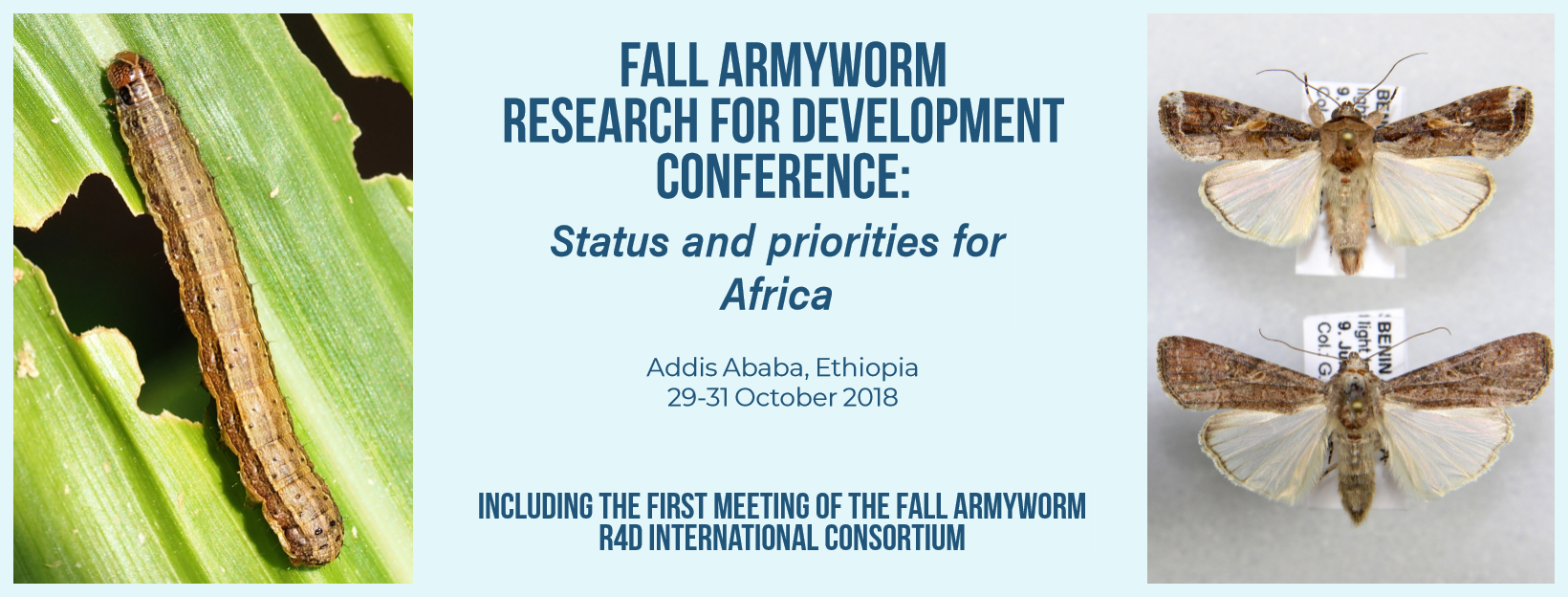Fall Armyworm Conference
“Fall Armyworm Research for Development: Status and priorities for Africa”

Background and Rationale
The Fall Armyworm (Spodoptera frugiperda) (FAW), an important crop pest native to the Americas, was first formally reported in Africa in January 2016, and subsequently confirmed in more than 40 countries. In the absence of natural biological control or adequate pest management, it poses a threat to the food securityand livelihoods of millions of African smallholders and their families. FAW prefers to infest maize, a dietary staple for more than 200 million people in sub-Saharan Africa, but also feeds on a wide range of other important crops, including sorghum, millet, rice, groundnut, cotton and vegetables.
The Nairobi Conference on Fall Armyworm in Africa organized jointly by CIMMYT, AGRA and FAO (April 27-28, 2017) brought together over 160 experts and stakeholders from African governments, international and national agricultural research organizations, non-governmental organizations, national plant protection organizations, development partners, and donors. Since then, several important meetings and training workshops have been held, publications/communication materials were brought out, and a number of important resources, including the Fall Armyworm Monitoring and Early Warning System, are now available. Several meetings were held to raise awareness and to leverage funds among Resource partners, the last one held at FAO in Rome on 25th June 2018, including presentations given by CIMMYT, IITA, CABI and ICIPE, to showcase current research and highlight funding gaps.
There is still an urgent need to continue to generate widespread awareness and to empower the farming communities with knowledge of the pest, along with suitable technologies/management practices for its sustainable management. We continue to learn from the experiences of countries like the US and Brazil where the pest has been successfully managed for over 100 years. At the same time, we are getting to understand various ecological factors that influence the pest ecology in the new environment in Africa and developing technologies that are useful for its management as relevant to the African agro-ecologies and cropping systems landscapes. It is indeed clear that there is no single solution for sustainable management of FAW in Africa, and we need to have an evidence-based, inclusive and well-balanced IPM strategy.
Need for concerted, coordinated and accelerated actions on FAW R4D in Africa
A call for joining the FAW R4D International Consortium has been recently given by CIMMYT and IITA, for bringing together diverse institutions in public and private sectors worldwide to come together and to explore ways to synergistically work on short-, medium- and long-term solutions to tackle the challenge of FAW in Africa, and in other parts of the world where the pest is prevalent or may invade. This will allow us to build upon the experiences and actions to-date and articulate a common set of priorities. To date, more than 35 global institutions have either joined the FAW R4D International Consortium or expressed interest in supporting the same. The Consortium is expected to complement and contribute to the coordination efforts of FAO and national FAW task forces on sustainable management of FAW in Africa.
FAW R4D Conference in Addis Ababa
Goal: Establish an inclusive, science-based R4D initiative, by which evidence-based tools that are safe, effective, accessible and sustainable are developed/validated and deployed for FAW management by smallholder farmers across Africa.
Objectives
a) Introduce the FAW R4D International Consortium as a science-based platform for sustained collaboration, adaptation and learning for effective FAW management, by linking national, regional and global scientists as a learning community, with dynamic exchange of ideas, emerging research findings/evidences, and practices;
b) Identify and prioritize key R4D issues in various thematic areas of FAW management, including i) FAW ecology, monitoring, surveillance, early warning and ICT tools; ii) host plant tolerance/resistance; iii) biological control; iv) agro-ecological management (including agronomy, chemical ecology, population dynamics, landscape ecology, etc.); v) environmentally safer synthetic pesticides and biopesticides, and pesticide risk management; vi) socio-economic contexts and impact assessments; and vii) Policy support for appropriate accelerated response
c) Develop a set of priority actions and develop an action plan for resource mobilization on FAW R4D in Africa.
Consortium
…
Agenda
Presentations
Contact
For further information, contact:
Jennifer Johnson
Communications Officer
CGIAR Research Program on Maize (MAIZE)
CIMMYT, Mexico
Telephone: +52 (55) 5804 2004 ext. 1036
